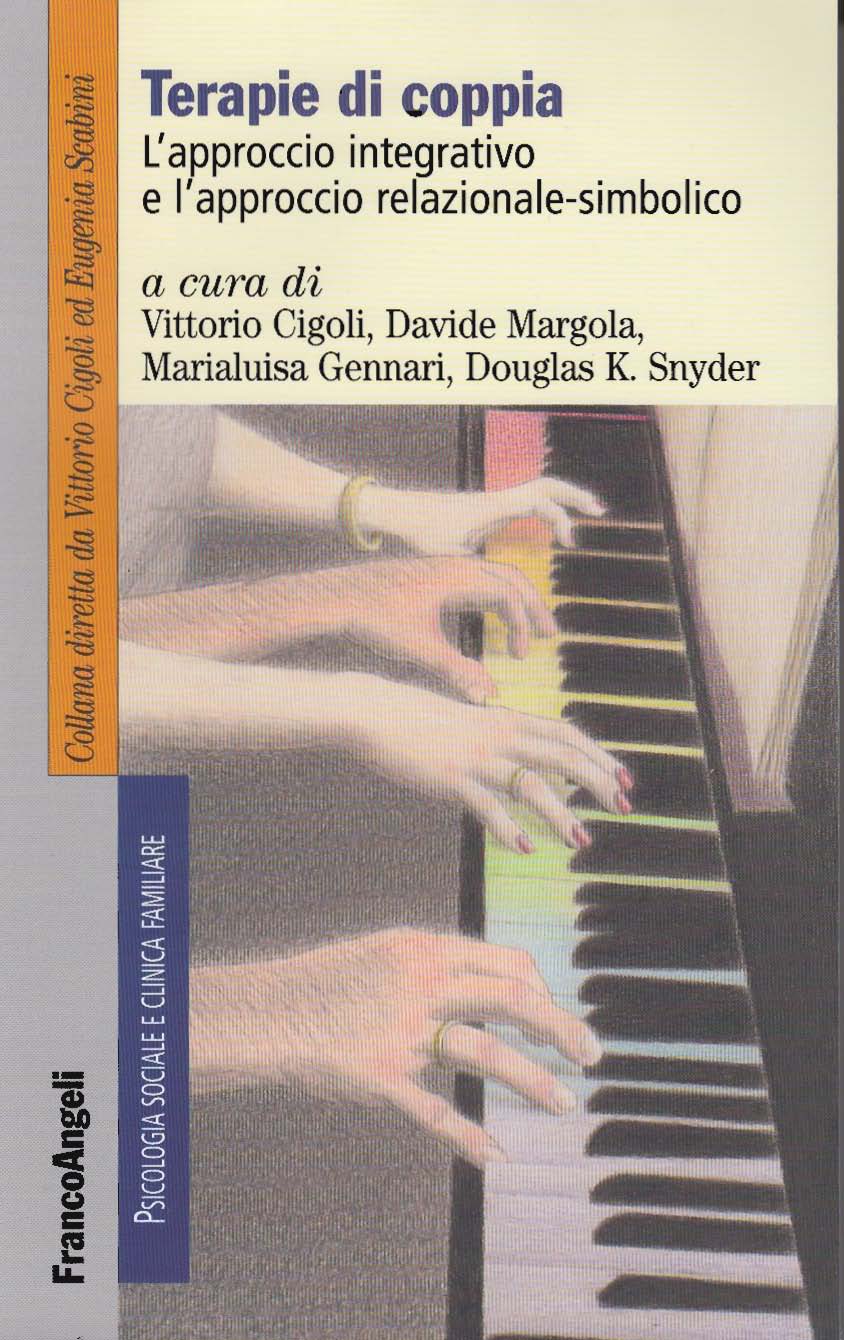.jpg)
Conceptual Approaches to Couple Therapy and Affective Reconstruction
(1) developing a collaborative alliance,
(2) containing disabling relationship crises,
(3) strengthening the couple dyad,
(4) promoting relevant relationship skills,
(5) challenging cognitive components of relationship distress, and
(6) examining developmental sources of relationship distress.
.jpg)
Consistent with our belief that couple therapy often proceeds in nonlinear fashion, the model depicts flexibility of returning to earlier therapeutic tasks as dictated by individual or relationship difficulties.
We've also argued that examining developmental sources of relationship distress can best be undertaken using techniques of affective reconstruction. In affective reconstruction, developmental origins of interpersonal themes and their manifestation in a couple's relationship are explored using techniques roughly akin to traditional interpretive strategies promoting insight, but emphasizing interpersonal schemas and relationship dispositions rather than instinctual impulses or drive derivatives. Previous relationships, their affective components, and strategies for emotional gratification and anxiety containment are reconstructed with a focus on identifying for each partner consistencies in their interpersonal conflicts and coping styles across relationships. In addition, ways in which previous coping strategies vital to prior relationships represent distortions or inappropriate solutions for emotional intimacy and satisfaction in the current relationship are articulated.
Our research has compared this insight-oriented approach to couple therapy with a traditional behavioral approach emphasizing communication skills training and behavior exchange techniques. At termination after approximately 20 sessions, couples in both treatment modalities showed statistically and clinically significant gains in relationship satisfaction compared to a wait-list control group. However, at four years following treatment, 38% of the behavioral couples had experienced divorce, in contrast to only 3% of couples treated in the insight-oriented condition. Based on these findings, we've argued that spouses' negative views toward their partner's behavior are modified to a greater degree and in a more persistent manner once individuals come to understand and resolve emotional conflicts they bring to the marriage from their own family and relationship histories.
References for this work include the following:
Snyder, D. K., & Wills, R. M. (1989). Behavioral versus insight-oriented marital therapy: Effects on individual and interspousal functioning. Journal of Consulting and Clinical Psychology, 57, 39-46.
Snyder, D. K., Wills, R. M., & Grady-Fletcher, A. (1991). Long-term effectiveness of behavioral versus insight-oriented marital therapy: A four-year follow-up study. Journal of Consulting and Clinical Psychology, 59, 138-141.
Snyder, D. K., Wills, R. M, & Grady-Fletcher, A. (1991). Risks and challenges of long-term psychotherapy outcome research: Reply to Jacobson. Journal of Consulting and Clinical Psychology, 59, 146-149.
Snyder, D. K., & Wills, R. M. (1991). Facilitating change in marital therapy and research. Journal of Family Psychology, 4, 426-435.
Snyder, D. K., Mangrum, L. F., & Wills, R. M. (1993). Predicting couples' response to marital therapy: A comparison of short- and long-term predictors. Journal of Consulting and Clinical Psychology, 61, 61-69.
Whisman, M. A., & Snyder, D. K. (1997). Evaluating and improving the efficacy of conjoint couple therapy. In W. K. Halford and H. J. Markman (Eds.), Clinical handbook of marriage and couples interventions (pp. 679-693). New York: Wiley.
Snyder, D. K. (1999). Affective reconstruction in the context of a pluralistic approach to couples therapy. Clinical Psychology: Science and Practice, 6, 348-365.
Snyder, D. K. (2002). Integrating insight-oriented techniques into couple therapy. In J. H. Harvey & A. E. Wenzel (Eds.), A clinician’s guide to maintaining and enhancing close relationships (pp. 259-275). Mahwah, NJ: Erlbaum.
Snyder, D. K., & Schneider, W. J. (2002). Affective reconstruction: A pluralistic, developmental approach. In A. S. Gurman & N. S. Jacobson (Eds.), Clinical handbook of couple therapy (3rd ed.) (pp. 151-179). New York, NY: Guilford Press.
Snyder, D. K., & Whisman, M. A. (2003). Treating difficult couples: Helping clients with coexisting mental and relationship disorders. New York, NY: Guilford Press.
Snyder, D. K., Schneider, W. J., & Castellani, A. M. (2003). Tailoring couple therapy to individual differences: A conceptual approach. In D. K. Snyder & M. A. Whisman (Eds.), Treating difficult couples: Helping clients with coexisting mental and relationship disorders (pp. 27-51). New York, NY: Guilford Press.
Snyder, D. K., & Whisman, M. A. (2003). Understanding psychopathology and couple dysfunction: Implications for clinical practice, training, and research. In D. K. Snyder & M. A. Whisman (Eds.), Treating difficult couples: Helping clients with coexisting mental and relationship disorders (pp. 419-438). New York, NY: Guilford Press.
Snyder, D. K., & Whisman, M. A. (2004). Treating distressed couples with coexisting mental and physical disorders: Directions for clinical training and practice. Journal of Marital and Family Therapy, 30, 1-12.
Cook, W. J., & Snyder, D. K. (2005). Analyzing nonindependent outcomes in couple therapy using the actor-partner interdependence model. Journal of Family Psychology, 19, 133-141.
Snyder, D. K., Castellani, A. M., & Whisman, M. A. (2006). Current status and future directions in couple therapy. Annual Review of Psychology, 57, 317-344.
Snyder, D. K., Simpson, J. A., & Hughes, J. N. (Eds.) (2006). Emotion regulation in couples and families: Pathways to dysfunction and health. Washington, DC: American Psychological Association.
Snyder, D. K., Hughes, J. N., & Simpson, J. A. (2006). Family emotion regulation processes: Implications for research and intervention. In D. K. Snyder, J. A. Simpson, & J. N. Hughes (Eds.), Emotion regulation in couples and families: Pathways to dysfunction and health (pp. 293-305). Washington, DC: American Psychological Association.
Mitchell, A. E., Castellani, A. M., Sheffield, R. L., Joseph, J. I., Doss, B. D., & Snyder, D. K. (2008). Predictors of intimacy in couples' discussions of relationship injuries: An observational study. Journal of Family Psychology, 22, 21-29.
Snyder, D. K., & Mitchell, A. E. (2008). Affective reconstructive couple therapy: A pluralistic, developmental approach. In A. S. Gurman (Ed.), Clinical handbook of couple therapy (4th ed.) (pp. 353-382). New York: Guilford Press.
Hahlweg, K., Baucom, D. H., Grawe-Gerber, M., & Snyder, D. K. (2010). Strengthening couples and families: Dissemination of interventions for the treatment and prevention of couple distress. In K. Hahlweg, M. Grawe-Gerber, & D. H. Baucom (Eds)., Enhancing couples: The shape of couple therapy to come (pp. 3-29). Göttingen, Germany: Hogrefe.
Snyder, D. K., & Gasbarrini, M. F. (2010). Integrative approaches to couple therapy: Implications for clinical practice, training, and research. In K. Hahlweg, M. Grawe-Gerber, & D. H. Baucom (Eds)., Enhancing couples: The shape of couple therapy to come (pp. 47-60). Göttingen, Germany: Hogrefe.
Snyder, D. K. (2010). Treatment of low sexual desire in the context of comorbid individual and relationship dysfunction. In S. R. Leiblum (Ed.), Treating sexual desire disorders: A clinical casebook (pp. 181-200). New York, NY: Guilford Press.
Heinrichs, N., Cronrath, A., Degen, M., & Snyder, D. K. (2010). The link between child emotional and behavioral problems and couple functioning. Family Science, 1, 152-172.
Gurman, A. S., & Snyder, D. K. (2011). Couple therapy. In J. C. Norcross, G. R. VandenBos, & D. K. Freedheim (Eds.), History of psychotherapy: Continuity and change (2nd ed.) (pp. 485 496). Washington, DC: American Psychological Association.
Gasbarrini, M. F., & Snyder, D. K. (2011). Affective reconstruction: An integrative couple treatment applied to parental bereavement. In D. K. Carson & M. Casado-Kehoe (Eds.), Adventures in couple therapy: A theory-based case study approach (pp. 345-356). New York, NY: Routledge.
Halford, W. K., & Snyder, D. K. (2012). Universal processes and common factors in couple therapy and relationship education. Behavior Therapy, 43, 1-12.
Snyder, D. K., & Balderrama-Durbin, C. (2012). Integrative approaches to couple therapy: Implications for clinical practice and research. Behavior Therapy, 43, 13-24.
Snyder, D. K., & Halford, W. K. (2012). Evidence-based couple therapy: Current status and future directions. Journal of Family Therapy. 34, 229-249.
Abbott, B. V., & Snyder, D. K. (2012). Integrative approaches to couple therapy: A clinical case illustration. Journal of Family Therapy. 34, 306-320.
Heyman, R. E., Slep, A. M. S., Sabathne, C., Erlanger, A. C. E., Hsu, T. T., Snyder, D. K., Balderrama-Durbin, C., Cigrang, J. A., Talcott, G. W., Tatum, J., Baker, M. T., Cassidy, D., & Sonnek, S. M. (2015). Development of a multilevel prevention program for improved relationship functioning in active duty members. Military Medicine, 180, 690-696.
Gasbarrini, M. F., Snyder, D. K., Iafrate, R., Bertoni, A., Donato, S., & Margola, D. (2015). Investigating the relation between stress and marital satisfaction: The moderating effects of dyadic coping and communication. Family Science, 6, 143-149.
Snyder, D. K., Balderrama-Durbin, C., Cigrang, J., Talcott, G. W., Slep, A., & Heyman, R. (2016). Help-seeking among Airmen in distressed relationships: Promoting relationship well-being. Psychotherapy, 53, 1-12.
The following books are available from Guilford Publications:
Snyder, D. K., & Whisman, M. A. (2003). Treating difficult couples: Helping clients with coexisting mental and relationship disorders. New York: Guilford Press.
Snyder, D. K., & Monson, C. (2012). Couple-based interventions for military and veteran families: A practitioner's guide. New York: Guilford Press.
Gurman, A. S., Lebow, J., & Snyder, D. K. (2015). Clinical handbook of couple therapy (5th ed.). New York: Guilford Press.
370 Seventh Avenue
Suite 1200
New York, NY 10001-1020
Phone: 800-365-7006 Fax: 212-966-6708
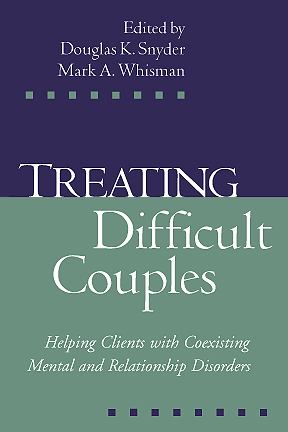
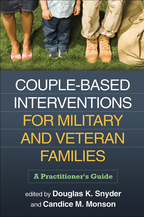
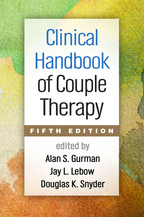
The following book is available from the American Psychological Association:
Snyder, D. K., Simpson, J. A., & Hughes, J. N. (2006). Emotion regulation in couples and families: Pathways to dysfunction and health. Washington, D.C.: American Psychological Association.
American Psychological Association
750 First Street, NE
Washington, DC 20002-4242
Phone: 800-374-2721
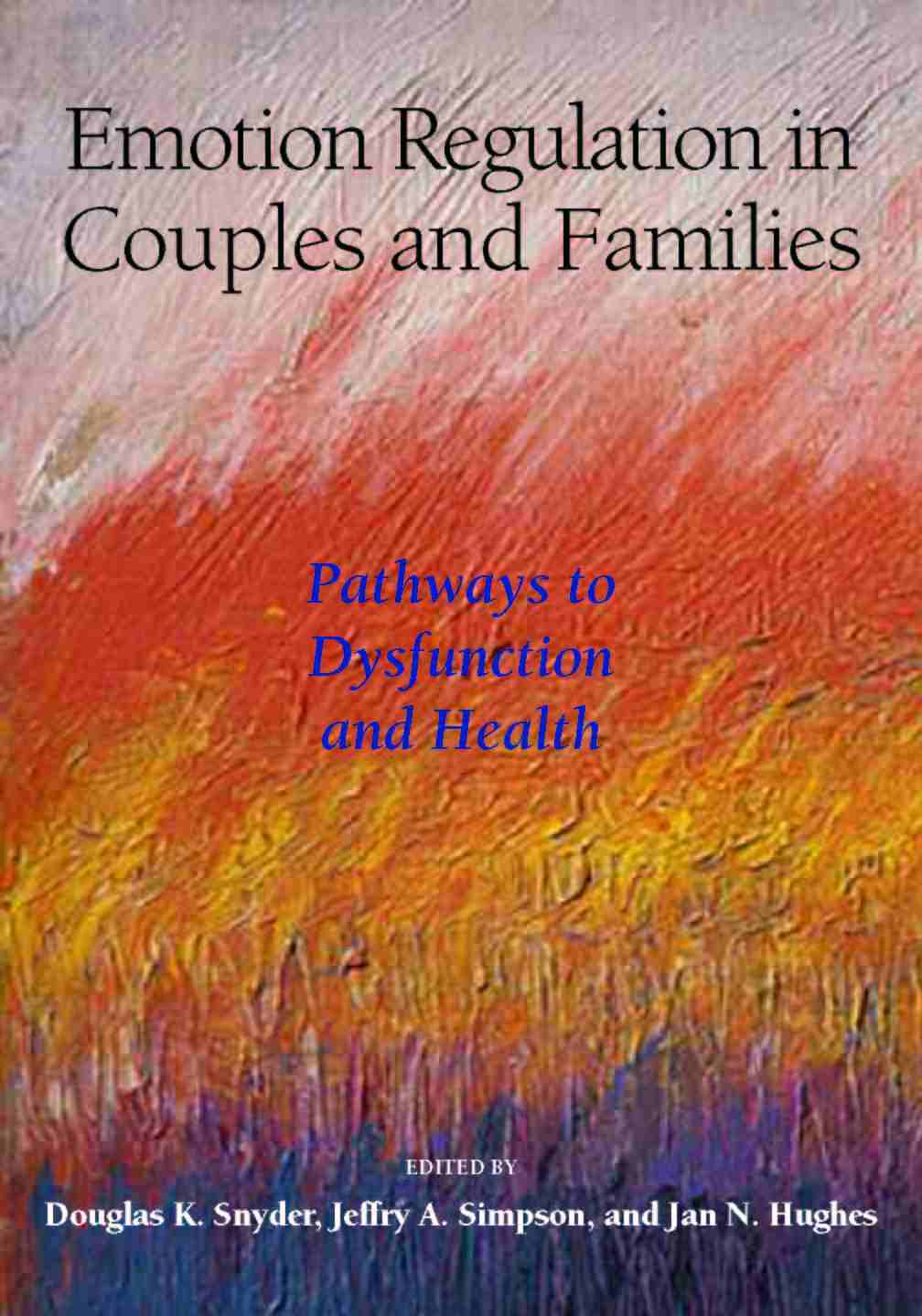
The following book is available from Franco-Angeli Press:
Cigoli, V., Margola, D., Gennari, M., & Snyder, D. K. (2014). Terapie di coppia: L'Approccio integrativo e l'approccio relazionale-simbolico [Couple therapy: The integrative approach and the relational-symbolic approach] . Milan, Italy: Franco Angeli.
FrancoAngeli
Viale Monza 106
20127 Milano ITALY
Tel: 02 2837141 Fax: 02 26144793
